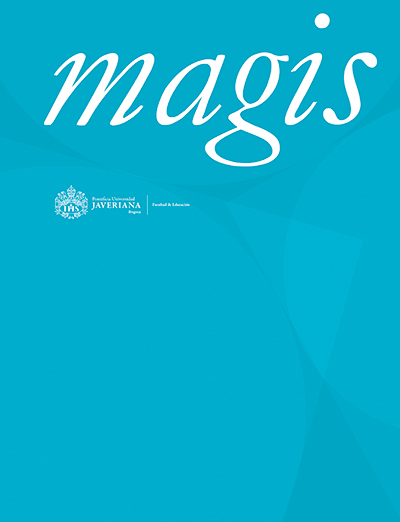Learning and the Rhizome: Reconceptualisation in the Qualitative Research Process
##plugins.themes.bootstrap3.article.details##
Este artículo explora el concepto de aprendizaje como espacio de intercambio y conexión entre signos, acontecimientos y cuerpos inspirado por la filosofía de la diferencia de Gilles Deleuze. Esta metodología cualitativa se basa en el Rizoma con sus características o principios de heterogeneidad, multiplicidad y a-significación, entre otras cosas. Permite una conversación productiva con estudios de entornos de aprendizaje y de producción de sentido a través de imágenes y sonidos provenientes de medios cinematográficos, tales como el del nadador y la natación. Se enfoca en el aprendizaje, su entorno y su papel en la relación entre mente y mundo.
Learning, qualitative analysis, knowledge, philosophy education, rhizome, representationalismAprendizaje, análisis cualitativo, conocimiento, educación en filosofía, rizoma, representacionalísmo
Bellour, R. & Hardyck, A. (2012). Raymond Bellour: between-the-Images. Zurich: JRP/Ringier.
Bennett, J. (2010). Vibrant Matter: A Political Ecology of Things. Duke and London: Duke University Press.
Bhaskar, R. (1998). General Introduction. In M. Archer, R. Bhaskar, A. Collier, T. Lawson & A. Norrie (eds.). Critical Realism: Essential Readings, ix-xxiv, London: Routledge.
Bogue, R. (2008). Search, Swim and See. In I. Semetsky (ed.). Nomadic Education - Variations on a Theme by Deleuze and Guattari, 1-16. Rotterdam: Sense Publishers.
Brandom, R. (1994). Making it Explicit: Reasoning, Representing, and Discursive Commitment. Cambridge, Massachusetts: Harvard University Press.
Brandom, R. (2000). Articulating Reasons: An Introduction to Inferentialism. Cambridge, Massachusetts: Harvard University Press.
Brandom, R. (2004). The Pragmatist Enlightenment (and its Problematic Semantics), European Journal of Philosophy 12(1), 1-16. https://doi.org/10.1111/j.0966-8373.2004.00196.x
Buchanan, I. M. (2017). Assemblage Theory, or, the Future of an Illusion. Deleuze Studies, 11 (3), 457-474. http://dx.doi.org/10.3366/dls.2017.0276
Colman, F. J. (2010). Rhizome. In A. Parr (eds.). The Deleuze Dictionary, 232-235. Edinburgh: Edinburgh University Press.
Deleuze, G. (1968). Différence et repetition (Paris, Presses Universitaires de France, PUF). Difference and Repetition. Paul Patton (transl.). New York: Columbia University Press.
Deleuze, G. (1993). The Fold: Leibniz and the Baroque. Tom Conley (trans.). Minneapolis: University of Minnesota Press.
Deleuze, G. (2006). Nietzsche and Philosophy. Michael Hardt (trans.). New York: Columbia University Press, European Perspectives Series.
Deleuze, G. & Guattari, F. (1980). Mille Plateaux. (Paris: Minuit). A Thousand Plateaus, by Brian Massumi (trans.). Minneapolis: University of Minnesota Press.
Fodor, J. & Lepore, E. (2007). Brandom Beleaguered. Philosophy and Phenomenological Research, 74 (3), 677-691. https://doi.org/10.1111/j.1933-1592.2007.00045.x
Kawamura, Y. (2005). Lethe. Available at: https://www.youtube.com/watch?v=nTnEsNL7Y48
Lambert, G. (2012). In Search of a New Image of Thought: Gilles Deleuze and Philosophical Expressionism. Minneapolis: University of Minnesota Press.
MacLure, M. (2013). Researching without Representation? Language and Materiality in Post-Qualitative Methodology. International Journal of Qualitative Studies in Education, 26 (6), 658-667. https://doi.org/10.1080/09518398.2013.788755
Masny, D. (2013). Rhizoanalytic Pathways in Qualitative Research: Problematizing the Qualitative. Qualitative Inquiry, 19 (5), 339-348. https://doi.org/10.1177/1077800413479559
Masny, D. (2016). Problematizing Qualitative Research: Reading a Data Assemblage With Rhizoanalysis. Qualitative Inquiry, 22 (8), 666-675. https://doi.org/10.1177/1532708616636744
Mazière, M. (1987). Swimmer. United Kingdom, France. Available at: https://www.youtube.com/watch?v=yeqpjZnynoo
Rancière, J. (2013). Remarks by Way of a Postface. In P. Bowman (ed.). Rancière and Film, 185-193. Edinburgh: Edinburgh University Press.
Scott, D. (2011). Education, Epistemology and Critical Realism. London, New York: Routledge.
Sellars, W. (1997). Empiricism and the Philosophy of Mind. Cambridge, Massachusetts: Harvard University Press.
Semetsky, I. & Delpech-Ramey, J. A. (2012). Jung’s Psychology and Deleuze’s Philosophy: The Unconscious in Learning. Educational Philosophy and Theory, 44 (1), 69-81. https://doi.org/10.1111/j.1469-5812.2010.00670.x
Standish, P. (2016). The Disenchantment of Education and the Re-enchantment of the World. Journal of Philosophy of Education, 50 (1), 98-116. https://doi.org/10.1111/1467-9752.12176
Taylor, C. (1985). Human Agency and Language: Philosophical Papers 1, Chapter 1: What is Human Agency? and Chapter 3: Hegel’s Philosophy of Mind. Cambridge: Cambridge University Press.
Taylor, C. (2011). Dilemmas and Connections. Harvard, Massachusetts: Harvard University Press.


